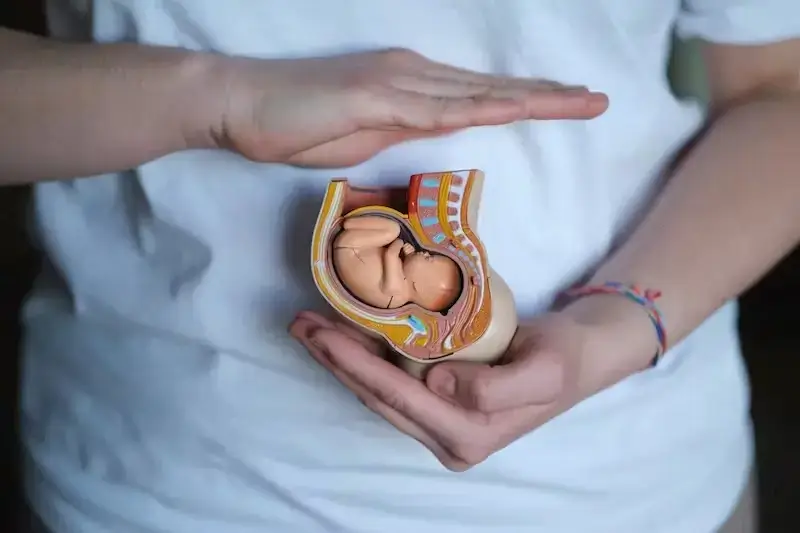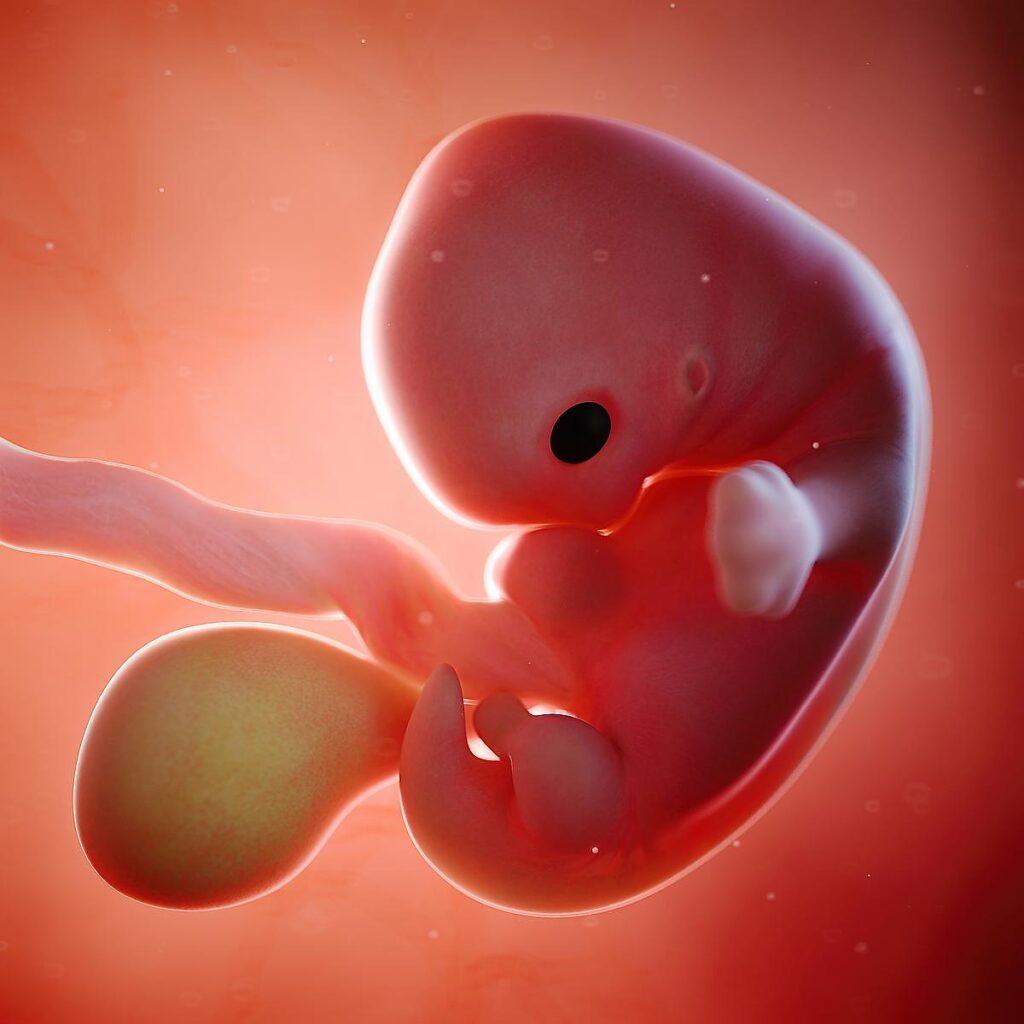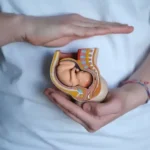
If you are 7 weeks pregnant, your baby has now reached the size of a cranberry and his organs and facial features keep developing. You might still be suffering from nausea and will probably need a larger bra very soon.
Related: 31 Surprising Things You May Not Know About Pregnancy
7 Weeks Pregnant – Fetus

Your baby could boast of some impressive developments at 7 weeks pregnant! Eyelids are forming, as well as mouth and tongue and the eyes and ears keep developing. The inner ear starts to form and in a few weeks, the embryo will have a fully formed outer ear. If you could peep into your womb, you would see that the embryo has a big head with a protruding forehead, and for a good reason: the brain is growing at an amazing rate.
The embryo already has a pancreas, an appendix and kidneys, that will soon begin to dispose of urine in the near future. Until the embryo’s bone marrow is ready to produce red blood cells, the liver is responsible for the task. The limb buds start to develop cartilage. The cartilage will soon grow into the bones, and meanwhile, the arm buds are getting longer and are already developing into segments: hand, arm, shoulder, leg, knee and foot are starting to grow. The intestines keep developing, bulging into the embryo’s umbilical cord and the heart beats fast. At 7 weeks pregnant, he is now measuring 0.3 inch/ 7.9 mm, the size of a cranberry, and already looks like a tiny baby.
Related: The Ultimate Guide: How to Tell Your Boss You’re Pregnant (Scripts Included)
7 Weeks Pregnant – Symptoms
At 7 weeks pregnant, nausea, food aversions, heartburn and excessive salivation might still be giving you a hard time and eating (as well as riding a bus or walking past restaurants) might feel like an unpleasant chore, not only due to the nausea but because of the temporarily heightened sense of smell. Virtually everything seems to be giving off a powerful aroma and it is not pleasant! To make things better eat small, frequent meals and avoid spicy, acidic foods that might trigger nausea. No one will tell you how to cure nausea, but it usually subsides by itself by the 14th week, plus another month or so. Consuming ginger and vitamin B6 may help, and if things get really bad, your caregiver can prescribe you an anti-nausea medication. You’re also likely to feel very tired and if you suffered from migraines before pregnancy, they may be worse now, though not necessarily.
Your blood volume at 7 weeks pregnant has increased by about 10 percent in the last weeks and will keep increasing to 40 – 45 percent by the end of your pregnancy. This, as well the growing uterus pressing on your bladder, is responsible for your constant urge to pee that will probably keep you running to the bathroom too often until the end of pregnancy. Other symptoms you might experience include food aversions and sensitive breasts and nipples. You might also find that your breasts are larger than they used to be and that the pink area around the nipple (the areola) now looks much larger and darker, with small bumps on it. The bumps are called Montgomery tubercles, and they are actually sweat glands supplying lubrication to the areola. The changes in your breasts are due to the activity of estrogen and progesterone. These omnipotent pregnancy hormones increase the blood flow to your breasts and build a layer of fat to prepare your body for breastfeeding your baby.
Related: Best 10 Pregnancy Pillows for Happy Pregnancy
7 Weeks Pregnant – Questions
So you already know what you should and shouldn’t eat and drink for a healthy pregnancy around 7 weeks pregnant. However, we cannot control everything. Sometimes we get ill, and it’s important to know what to do if it happens during pregnancy.
1. What Happens If I get Sick During Pregnancy?
The developing baby is most vulnerable during the first trimester, so avoid taking medications during these months if possible. If you catch a cold, make sure to avoid nonsteroidal anti-inflammatory pain relievers such as aspirin and ibuprofen, especially during the third trimester.
Some liquid cold medicines contain alcohol, so choose products that are labeled “alcohol-free”.
Avoid nasal spray decongestants that contain pseudoephedrine in the first trimester, as they pose a risk of causing abdominal birth defects. The rest of nasal sprays are low risk.
As for antibiotics, some of them are safe to take, and others are not, but if you’re seriously ill and need to take an antibiotic, you may need to take it, because the illness itself could be more risky for the baby than the medicine. To sum this up, check with your caregiver before taking any kind of medicine during pregnancy.
Related: Tips for an Alcohol-Free Pregnancy
Related: Best 10 Pregnancy Pillows for Happy Pregnancy
2. Are there Other Diseases to Watch Out for?
Rubella and Parvovirus B19: Contracting illnesses like parvovirus B19 and rubella during the early weeks of pregnancy can lead to serious health problems for the baby. Rubella (German measles) in early pregnancy may result with a baby born with congenital rubella syndrome (CRS) which causes deafness, as well as eye and heart diseases, or even miscarriage. Parvovirus B19 (also called the fifth disease or the slapped cheek syndrome due to a bright red rash that usually appears on both cheeks) can cause miscarriage or stillbirth and possibly developmental abnormalities. Rubella and Parvovirus B19 are most often picked up from children, so try to avoid visiting kindergartens and playgrounds if possible.
Toxoplasmosis: If you have a cat that goes outside, you are at risk of toxoplasmosis. This infection is caused by the T. gondii parasite found in cat feces, raw and undercooked meat, unwashed fruits and vegetables and contaminated water, dust or soil. The disease is not dangerous for cats or adult humans but it is dangerous for the fetus, causing blindness, hearing loss and intellectual disability.
Make sure to wash fruit and vegetables before eating them. Don’t get a new cat during pregnancy and avoid stray cats, especially kittens. If you already have a cat, don’t feed it raw meat. The litter box should be changed daily, as it takes some time until the parasite becomes infectious. Have someone else clean the litter box and handle gardening or a sandbox, or at least wear gloves and wash your hands thoroughly afterwards. Symptoms typically include: fever, headache, muscle pain, a stiff neck and swollen glands, but about 90% of the infected don’t have any noticeable symptoms and cats don’t get any symptoms at all, which makes toxoplasmosis extremely difficult to detect. If you do experience any of the symptoms listed above, see your doctor as soon as possible.
Related: 8 Weeks Pregnant – Fetus
Related: What Are The Benefits Of A Prenatal Massage?

